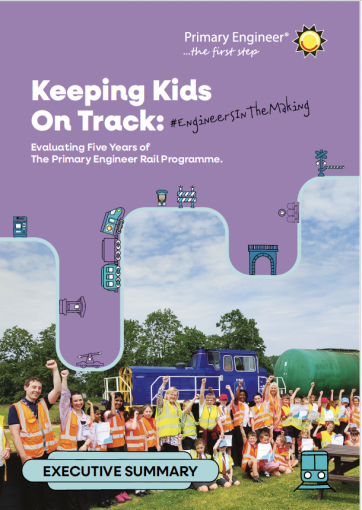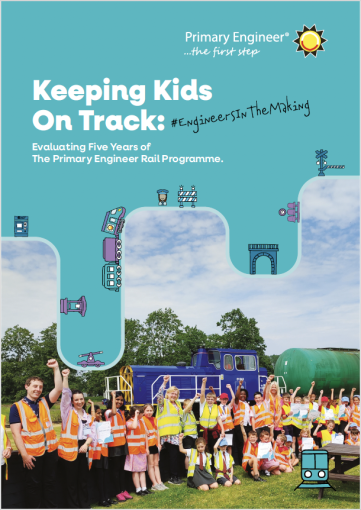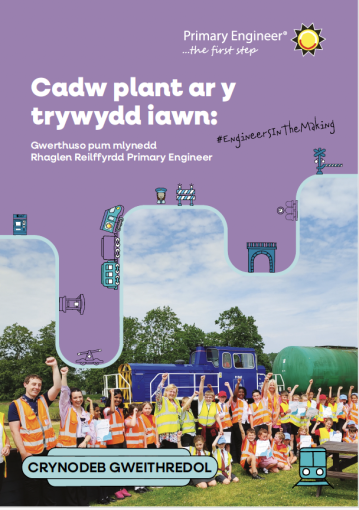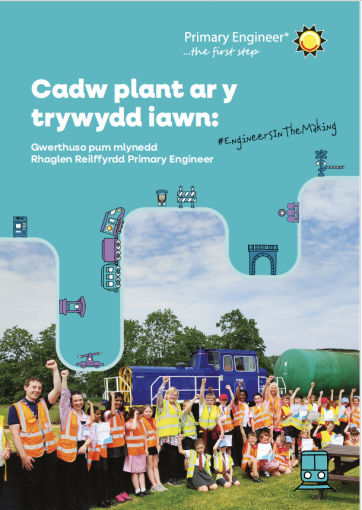The post National Apprenticeship Week 2025 – employee spotlight first appeared on Primary Engineer.
]]>Our two apprentices, Jack and Demi, both have a fabulous future with us, acquiring skills and knowledge whilst working with our world-class partners!
Get an insight into their experiences!
When did you join the Primary Engineer team and what does your role involve?
Jack: I joined the Primary Engineer team on 18th October 2022 as a Finance Assistant. My role involves supporting the accounting needs of the company, managing incoming and outgoing invoices, assisting with reporting and administrative duties.
Demi: I joined Primary Engineer at the start of January of this year so everything is still very new to me! I am a marketing apprentice which means I assist in all things marketing such as events, social media and graphic design!
What pathway led you to this apprenticeship?
Jack: I chose to become an apprentice as I much prefer the best of both worlds approach, learning at college whilst gaining experience in a working environment. The combination is widening my skill set, helping me develop skills a lot quicker and is an overall more enjoyable approach to learning. The apprenticeship I’m currently on, Level 3 in AAT (Association Of Accounting Technicians), will set me on the right pathway to becoming a fully-qualified accountant and achieving my goals. Looking further down the line though, once I’m comfortable with my skills and knowledge, I’d like to own my own accountancy firm.
Demi: I took an unconventional path to this apprenticeship, like many graduates, I found myself unsure of what career I wanted to pursue after university. It wasn’t until I discovered my interest in marketing that I even considered it as a career. Despite having no formal experience in the field, I was drawn to the idea of marketing and the dynamic nature of the industry. I feel so lucky to have the opportunity to not only work at Primary Engineer but also learn about professional marketing through formal education. The apprenticeship appealed to me because it offered a hands-on approach to learning. I had never studied marketing before, and I loved the idea of combining classroom education with real-world experience. This dual approach would give me the chance to gain both theoretical knowledge and practical skills, ensuring my understanding of marketing is well-rounded. Currently, I’m studying on a Multi-Channel Marketing apprenticeship with an emphasis on customer-based marketing activities. This course is designed to equip me with the essential tools and knowledge I need to support the marketing team at Primary Engineer, while broadening my skill set for future opportunities in the field.
What skills have you learnt in your apprenticeship that you wouldn’t have learnt otherwise?
Jack: Throughout my apprenticeship, I have learnt a lot about the accountancy field and my communication skills have improved majorly.
Demi: Through my apprenticeship, I’ve learned a variety of skills that I definitely wouldn’t have gained otherwise. One of the most valuable has been learning how to apply marketing theory directly to real-world projects. The hands-on experience I’m getting while working with the team at Primary Engineer is allowing me to develop a practical understanding of multi-channel marketing, customer-based activities, and campaign management—skills I wouldn’t have developed purely through traditional education.
What do you like about your job?
Jack: I enjoy working here for a few reasons! Everyone is really easy to get along with, it’s such a calm workplace environment and I feel the organisation is run well which makes such a big impact on how enjoyable coming to work is for all the employees. In terms of my day-to-day work, I like ensuring everything is in order so it tends to be very satisfying having systems and processes in place to follow. Most importantly though, I feel well supported here by everyone but in particularly by those I work closely with Jamie (Operations Director).
Demi: Although I’m still relatively new to my role, I already absolutely love working in the marketing team at Primary Engineer! Everyone has been incredibly welcoming, and the support from the team has made it so easy for me to settle in. What I enjoy most is that every day brings something different. There’s always a new project or task to tackle, which keeps things exciting. I especially love when the whole team collaborates on a campaign—it’s a great feeling to come together, share ideas, and work collectively towards a common goal.
What would you say to anyone considering an apprenticeship?
Jack: I would say to anybody considering an apprenticeship is, do it! In my opinion, it is the best way to learn as well as gaining all the experience at the same time. Going down the apprenticeship route has helped me develop my personal skills and career so much so far.
Demi: I would definitely say go for it! An apprenticeship is a fantastic option at any stage of life. Personally, having gone from college to university and back to college again, I can honestly say I appreciate my education so much more now that it directly complements my job. An apprenticeship is, in my opinion, one of the best ways to step into your future career—no matter what field you’re interested in. It’s a chance to learn while doing, and you gain valuable skills that can set you up for long-term success. If you’re unsure about your next step, it’s definitely worth considering!
The post National Apprenticeship Week 2025 – employee spotlight first appeared on Primary Engineer.
]]>The post Mark your calendar for British Science Week! first appeared on Primary Engineer.
]]>Start planning for British Science Week! Primary Engineer’s fully-funded whole-school STEM competition is perfect for the 10-day celebration of science, technology, engineering and maths.
British Science Week 2025
British Science Week is an annual event that celebrates science, technology, engineering, and mathematics (STEM) across the United Kingdom. Organised by the British Science Association, the week-long initiative aims to engage people of all ages in various science-related activities, events, and discussions. It provides a platform for scientists, educators, and the public to come together, fostering a deeper understanding and appreciation for the importance of science in our daily lives. British Science Week encompasses a wide range of activities, from school-based projects to community events, promoting curiosity, exploration, and involvement in the world of science.
We are here to help teachers across the UK celebrate this important initiative.

Who is Primary Engineer?
Primary Engineer serves as a valuable resource for teachers, providing practical support and a range of programs to enrich classroom learning. With a focus on inspiring future engineers and innovators, the organisation offers educators access to hands-on projects and challenges. Dedicated to fostering creativity and critical thinking, Primary Engineer plays a significant role in shaping the educational landscape and preparing students for the opportunities in design and technology.

STEM Competition
Fully-funded, free and open to all schools in the UK, this UK-wide competition which asks pupils aged 3 – 19 ‘If you were an engineer, what would you do?’ is a great way to introduce your pupils to the fascinating world of science, technology, engineering and maths.
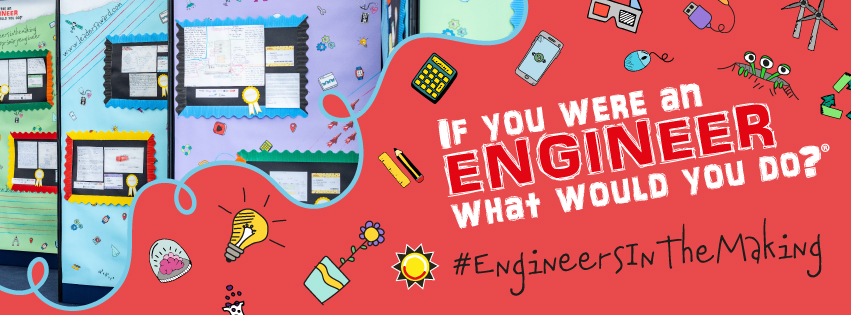
What does it involve?
Pupils are tasked with interviewing an engineer, where they get a better understanding of what engineering is, the career pathways involved as well as the opportunity to ask the questions that matter to them. The interview gives pupils the inspiration to come up with their own engineering ideas to a problem they identify whether that’s a problem relatable to themselves, their community or the world around them. The cross-curricular competition asks pupils to draw and annotate a solution to the problem whilst also writing a persuasive letter to tell the inspiring engineer about their solution and why it should be brought to life.
Scheduled Live Interviews

Friday 7th March – Seren White
One of the top 50 Women in Engineering 2024! Engineering comes in all shapes and sizes; you’ve just got to find the right fit.
As an experienced personal protection engineer, Seren is passionate about improving equipment for women.

Monday 10th March – Roger Smith
As a British watchmaker renowned for his meticulous craftsmanship and innovative approach to traditional horology, Roger specializes in bespoke, hand-made timepieces.
His small, independent workshop on the Isle of Man produces some of the finest and most technically advanced watches in the world, often blending traditional techniques with modern innovation.

Tuesday 11th March – Joseph
Join Joseph to dive deep into the exciting world of submarines and how an apprentice contributes to the next generation of nuclear submarines!

Wednesday 12th March – Daniel Innes
As a Launch Systems Engineer Daniel knows everything there is to know about rockets!

Thursday 13th March – Josh Hemmings
| Join Josh as he explores the development a supercar through his role as a vehicle development engineer. |

Friday 14th March – Marsha
| Marsha, a Design and Certification Engineer at Boeing, exploring how her love for Art and Maths led to an engineering career in aviation! |
For any schools or home learners interested in our live interviews, please visit our website!
What are the benefits?
The competition boosts pupils’ confidence in the classroom as every single pupil who takes part is recognised with a personalised graded certificate, with all entries that are submitted being read and graded by professional engineers. Entries are graded based on the quality of the idea, not the art skills or spelling of the letter so is suitable for all pupils regardless of academic ability and educational needs. In addition to fostering confidence in the classroom, the competition provides a unique opportunity for students to receive personalised recognition. Every participant, regardless of academic ability or educational needs, is acknowledged for their efforts.
Pupils build lasting memories at our regional exhibitions and awards ceremonies where their amazing, joyous and innovative ideas are showcased and celebrated.
Thanks to the support from Primary Engineer’s National and Regional Partners, the competition is fully-funded and free to all schools.
When you register on our Leaders Award website, you unlock access to cross-curricular lesson plans, pupil log-books, guides and curriculum mappings to help you teach STEM easily with a flexible approach in the classroom.

How do we get involved?
Simply register for free on the website here!
The post Mark your calendar for British Science Week! first appeared on Primary Engineer.
]]>The post Belvoir Rail Partners with Primary Engineer to Inspire Future Engineers first appeared on Primary Engineer.
]]>Through this collaboration, we’ll equip teachers with the tools and resources they need to confidently deliver engaging STEM lessons. Our engineers will also join students in the classroom, offering hands-on experiences to inspire the engineers of tomorrow.
What is the Primary Engineer Rail Programme?
The Primary Engineer Rail Programme is a STEM initiative that blends creativity and practical skills. Guided by professional engineers who bring real-world context to the classroom, students engage in project-based learning where they design, build, and test model rail vehicles.
This hands-on learning makes engineering fun, builds technical skills, and raises awareness of engineering careers, helping to close the UK’s engineering skills gap.
Why Belvoir Rail are partnering with Primary Engineer?
Primary Engineer offers more than just STEM education, they promote diversity in engineering. We want students from all backgrounds to see themselves as future engineers, breaking down stereotypes and showing that engineering is a field open to everyone.
Belvoir Rail are passionate about encouraging interest in STEM subjects and supporting the next generation of engineers. Their Communications Manager, Sonja Greschner, shares why this programme means so much to them:
“Early exposure to engineering can truly ignite a spark in young minds. By giving students the chance to roll up their sleeves and dive into STEM, we hope to spark a passion that could lead to a lifelong career in engineering. This isn’t just about building skills, it’s about building confidence and opening doors, showing students that anyone can be an engineer”
Belvoir Rail were especially inspired to participate in this programme after exhibiting at this year’s Rail Live event, where we were joined by students from the 2023/2024 Primary Engineer cohort. Seeing the pupils engage with real-world rail engineering showed them just how much enrichment activities like this can add.
The Impact of Primary Engineer
Primary Engineer has already made a huge difference, with over 117,000 pupils participating in the 2023-2024 academic year alone. We’re proud to join forces and help more students experience the excitement of engineering.
Primary Engineer is an educational not-for-profit organisation founded in 2005 which aims to engage both primary and secondary school pupils and teachers with the vast and inspirational world of engineering and technology. They work with businesses and industry across the UK to help develop a future, diverse generation of engineering and technology professionals.
By partnering with Primary Engineer, Belvoir Rail are committed to creating valuable opportunities for students to explore STEM subjects and see the real-world impact of what they learn in the classroom. We’re inspiring a new generation of diverse, skilled, and passionate young engineers, showing students just how bright their future in engineering can be.
And who knows? The next groundbreaking rail innovation could very well come from one of the young minds we’re inspiring today.
We are looking to grow the programme even more in 2024/2025, and if you want to partner with us you can learn more here: https://www.primaryengineer.com/funding-opportunities/
The post Belvoir Rail Partners with Primary Engineer to Inspire Future Engineers first appeared on Primary Engineer.
]]>The post Full steam ahead for STEM in Warwickshire first appeared on Primary Engineer.
]]>The programme is delivered to Key Stage 1 and Key Stage 2 children across the UK through Primary Engineer, a not-for-profit organisation whose vision is to ensure all children and pupils achieve their full potential through engagement with engineering.
During the training session, teachers met the Porterbrook engineers professionals who will support them throughout the year as their pupils learn to build their own model trains.
This will be third year Porterbrook has funded the Primary Engineer Rail Programme for schools local to its Long Marston Rail Innovation Centre.
Over the last two years, 1500 pupils in the areas surrounding the Long Marston Rail Innovation Centre have taken part in the programme. This year, students at ten primary schools will be involved.








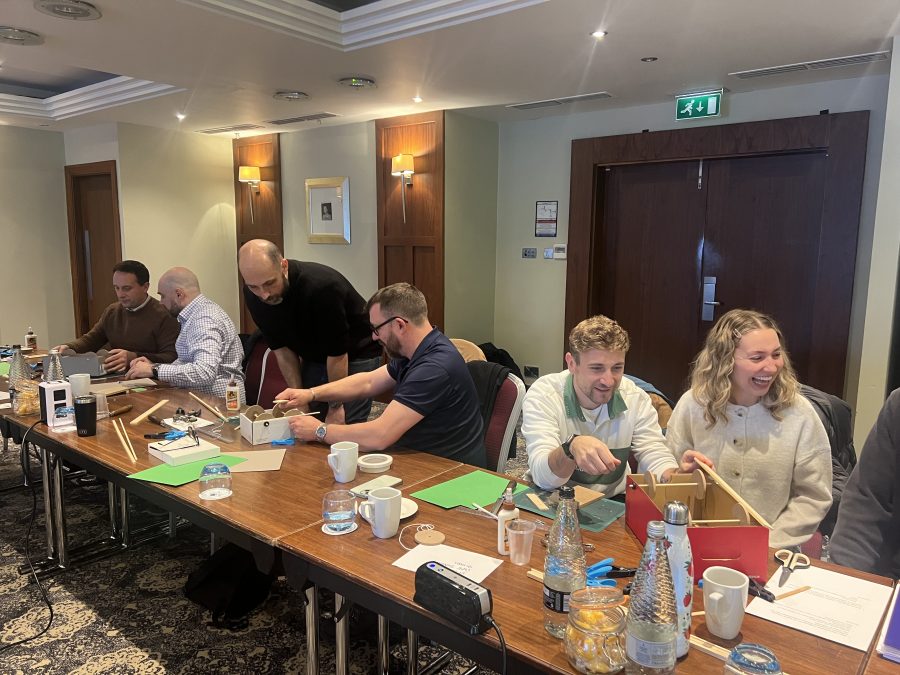

The post Full steam ahead for STEM in Warwickshire first appeared on Primary Engineer.
]]>The post Primary Engineer Celebrates Commitment to Real Living Wage first appeared on Primary Engineer.
]]>Primary Engineer is based in the North West, where 13.5% of all jobs pay less than the real Living Wage – around 397,000 jobs. Despite this, we have committed to pay the real Living Wage and deliver a fair day’s pay for a hard day’s work.
The real Living Wage is the only rate calculated according to the costs of living. It provides a voluntary benchmark for employers that wish to ensure their staff earn a wage they can live on, not just the government minimum. Since 2011 the Living Wage movement has delivered a pay rise to over 460,000 people and put £3 billion extra into the pockets of low paid workers.
Katherine Chapman, Director, Living Wage Foundation said: “We’re delighted that Primary Engineer has joined the movement of over 14,000 responsible employers across the UK who voluntarily commit to go further than the government minimum to make sure all their staff earn enough to live on.
“They join thousands of small businesses, as well as household names such as Burberry, Barclays, Everton Football Club and many more. These businesses recognise that paying the real Living Wage is the mark of a responsible employer and they, like Primary Engineer, believe that a hard day’s work deserves a fair day’s pay.”
About the Living Wage
The real Living Wage is the only rate calculated according to what people need to make ends meet. It provides a voluntary benchmark for employers that choose to take a stand by ensuring their staff earn a wage that meets the costs and pressures they face in their everyday lives.
The UK Living Wage is currently £12 per hour. There is a separate London Living Wage rate of £13.15 per hour to reflect the higher costs of transport, childcare and housing in the capital. These figures are calculated annually by the Resolution Foundation and overseen by the Living Wage Commission, based on the best available evidence on living standards in London and the UK.
The Living Wage Foundation is the organisation at the heart of the movement of businesses, organisations and individuals who campaign for the simple idea that a hard day’s work deserves a fair day’s pay. The Living Wage Foundation receives guidance and advice from the Living Wage Advisory Council. The Foundation is supported by our principal partners: Aviva; IKEA; Joseph Rowntree Foundation; KPMG; Linklaters; Nationwide; Nestle; Resolution Foundation; Oxfam; Trust for London; People’s Health Trust; and Queen Mary University of London.
What about the Government’s national living wage?
In July 2015 the Chancellor of the Exchequer announced that the UK Government would introduce a compulsory ‘National Living Wage’, this was introduced in April 2016 and applied to all workers over the age of 25.
From 1st April 2024, workers aged 21 and over will be entitled to the National Living Wage which is £11.44 an hour. The Government’s rate is different to the Living Wage rates calculated by the Living Wage Foundation. The ‘National Living Wage’ is a legal minimum and is based on percentage of average earnings, whereas the Living Wage Foundation’s real Living Wage rates are voluntarily paid by employers. Our rates are independently calculated, updated annually according to the cost of living and apply to anyone aged 18 and over. The ‘National Living Wage’ also does not have a separate rate which accounts for higher living costs in the capital. A UK worker paid the real Living Wage earns an extra £1092 a year more than someone on the ‘National Living Wage’.
For more about the difference and how we calculate the rate see their website.
The post Primary Engineer Celebrates Commitment to Real Living Wage first appeared on Primary Engineer.
]]>The post CEO Spotlight: Celebrating International Women In Engineering Day with Susan first appeared on Primary Engineer.
]]>We are catching up with our Chief Executive and Founder, Susan, to get her insight into her experience and to celebrate #INWED24.
We know that early engineering engagement is so important particularly for girls, tell us more.
Have you read a book called Invisible Women by Caroline Criado-Perez? It is one of my favourite ‘angry’ books – clearly illustrating why we need more women to be involved in the design and make stages of everything we use!
Our work at Primary Engineer is about empowering girls and women from all backgrounds and experiences to feel capable, have a voice and be part of those decision-making processes. Importantly though we do not do that in isolation as we need to ensure that the boys know girls can be engineers too. So, all our activities are aimed at all pupils together.
At the end of the day, we know that not all the girls and boys for that matter will choose to go into engineering, but we do know that they will know what an engineer is and does and that they will carry an engineering mindset into whatever career path they take – and that’s a great outcome. Plus, of course, many more will follow an engineering career too!
When you were little, what did you want to be when you grew up?
When I was little, I wanted to be a teacher, but I was always looking at business ideas too.
As a kid I have always painted and drawn but at school I didn’t think I could turn that into a career until I walked round the Graphic Design Department at the University of Central Lancashire – it just felt like I had come home!
Graphic Design involves a lot of creative problem-solving, illustration, design – taking ideas and making them clear and accessible to others. I loved that! After some time in industry, I came back to the idea of teaching completed a PGCert and worked in a Secondary School in Chorley for 8 years.
If you had to explain what you do to a school pupil, what would you say?
We take engineering into classrooms across the UK and I help design the way we do that. I help find the links to the people and industries that support us to work with more and more schools – but most importantly we help pupils see the opportunities open to them through engineering in all its incredible sectors.
Every day is different, every day we hear a stories about the impact of our work and every day I get to work with the best group of people!
What does a typical week look like for you?
Yes, there’s the usual morning coffee, lots of emails and meetings but there’s also such variety and excitement, a typical week is anything but typical!
Sometimes I’m based in the office or travelling around the UK for events and conversations with a range of people, whether that’s for product development, internal planning, or talking to people who want to learn more about what we do.
Anyone can have a conversation but to truly listen to what people are saying and understand what they are trying to achieve is something else entirely. I think I’ve always been a good listener even as a child.
Primary Engineer has a long history, do you have a favourite moment?
That’s a difficult question! How can I possibly choose one in particular above the rest when so much has happened. Honestly, too many have been extraordinary. What I do take great joy in is when I hear the buzz in the office when any one of the team shares a story from a pupil, a teacher, an engineer or an event – those moments without a doubt are fantastic!
Last question. What’s one bit of advice you’d give yourself when you were little?
It will be alright in the end. And if it’s not alright, it’s not the end.
Huge thank you to Susan and happy #INWED24

The post CEO Spotlight: Celebrating International Women In Engineering Day with Susan first appeared on Primary Engineer.
]]>The post Local schools win big at national engineering competition at The University of Edinburgh first appeared on Primary Engineer.
]]>These pupils had taken part in a national competition, run by Primary Engineer, where they answered the question “If you were an engineer, what would you do?”. Pupils get to interview an engineer and are then tasked with identifying a problem in the world around them and coming up with a creative solution to that problem
This national competition saw over 71,000 pupils from across the UK take part, entries are then graded by industry professionals before going to regional judging panels with two winners and two highly commended in each year group.
This week the highly commended and winning pupils were awarded trophies and framed certificates of their ideas, with 32 pupils from schools in Edinburgh, East Lothian, West Lothian and the Borders being celebrated.
Maria Laine, president of Boeing in the UK, Ireland and Nordic region and a national partner of the competition, presented the awards on the night:
“We know how important it is to nurture the next generation of scientists, engineers and aviators and our charitable partnerships, such as Primary Engineer, embody our commitment to shaping a brighter future for young people as well as supporting our talent pipeline”, said Maria Laine. “The ‘If you were an engineer, what would you do’ programme is pertinent but vitally, it is fun, and as a new national partner, Boeing’s 200+ STEM Ambassadors up and down the UK are enjoying every phase of this inspiring competition.”

Every year University and Industry Partners of Primary Engineer select an idea to turn into a working Prototype, and “The Glowbot” prototype was unveiled at the ceremony. Based on the idea of a Primary 1 student from Linlithgow Primary School, the Glowbot is designed to help children who are afraid of the dark find their way to the bathroom at night.
Professor Gareth Harrison, Head of School at the University of Edinburgh School of Engineering, opened the event:
“We were delighted to host this event with our long-standing partners Primary Engineer. Today’s celebration event brought the pupils, teachers and engineers back together for an awards ceremony and to view the exhibition of over 200 winning and highly commended entries for the South East Scotland region. It has been fantastic to see how the children have been able to identify problems and come up with such inventive solutions. It was also great to unveil the prototype for ‘The Glowbot’, of one of the winning entries from last year’s competition, built by our technical staff in conjunction with it’s primary school creator.”

Primary Engineer are hosting Public Exhibitions and Award Ceremonies being hosted all over the UK from May to July, with thousands of pupils engineering ideas being displayed for all to see, and you can find events near you on their website: https://leadersaward.com/exhibitions-and-events/
The full photo album from the event can also be found on the Leaders Award Facebook Page: https://www.facebook.com/leadersaward/

The post Local schools win big at national engineering competition at The University of Edinburgh first appeared on Primary Engineer.
]]>The post Educational Not-for-Profit launches report showcasing the impact of Engineering Outreach with expert panel at The University of Edinburgh. first appeared on Primary Engineer.
]]>
Leaders from industry, education and government came together for a panel to discuss the findings of a report from Primary Engineer and explore strategies for cultivating a vibrant skills landscape within the Scottish rail sector.
The report, titled “Keeping Kids on Track: Evaluating 5 Years of the Primary Engineer Rail Programme” sheds light on the significant positive impact the programme has had on primary school pupils across the UK. It has been running in Scotland, England & Wales and Primary Engineer are hosting three launches to address the specific needs of each education system.
For five years, the Primary Engineer Rail Programme has brought practical Rail Engineering into classrooms and helped inspire the next generation of engineers. Launched in 2018 with Hitachi Rail, the programme embeds engineering at the heart of learning as young pupils collaborate to design, build, and refine rail vehicle models. Over the course of five years the Primary Engineer Rail Programme has provided Rail Engineering learning opportunities for over 40,000 pupils.
The programme culminates in a Celebration Event where pupils test and challenge their designs and share what they have learned with engineering professionals. The report was launched with Scottish Engineering and The University of Edinburgh School of Engineering, who partner with Primary Engineer in Edinburgh. Panelists were able to see the impact of the Primary Engineer Rail Programme first hand, and the excitement this inspires amongst the pupils and teachers who take part.
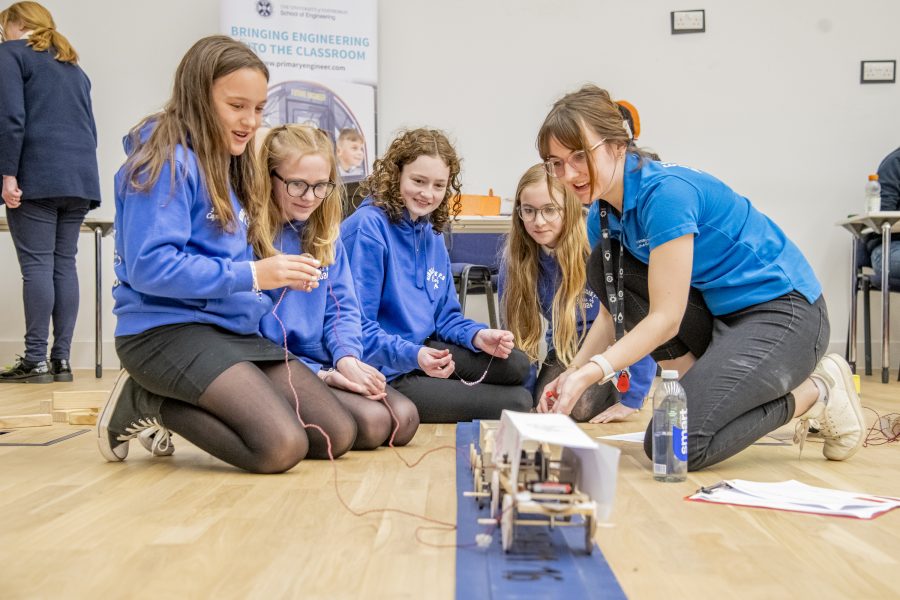
Professor Gareth Harrison, Head of the School of Engineering, The University of Edinburgh said:
“We were delighted to host this joint event with Primary Engineer and Scottish Engineering to discuss how we can shape the future of Scotland’s rail industry together. Having been proud partners of Primary Engineer for many years, we have seen the positive impact the Rail Programme has on local primary school pupils and the important role it plays in inspiring them about career opportunities in the sector.
Today also marked this year’s Rail Programme celebration event which brought the pupils, teachers and engineers back together on campus to showcase and test out their model train creations. It was fantastic to see how this initiative ignites a passion for engineering in young minds.”
Dr Susan Scurlock MBE, Founder and Chief Executive of Primary Engineer, was also on the panel. Commenting on launching the report in Scotland she said:
“The findings of the report overwhelmingly support that the Primary Engineer Rail Programme is successful in its objectives and shows that our approach has inspired young people to think differently about engineering – it has also helped them realise that anyone can be an engineer and sparked an interest in Rail Engineering.
It was amazing to be hosting this with The University of Edinburgh School of Engineering, they have been working with us for the best part of a decade and have been a core part of our success in Scotland. Huge thanks to our panelists Louise Shaw, Gordon Masterton, Lydia Fairman and our chair Paul Sheerin for sharing their expertise.”
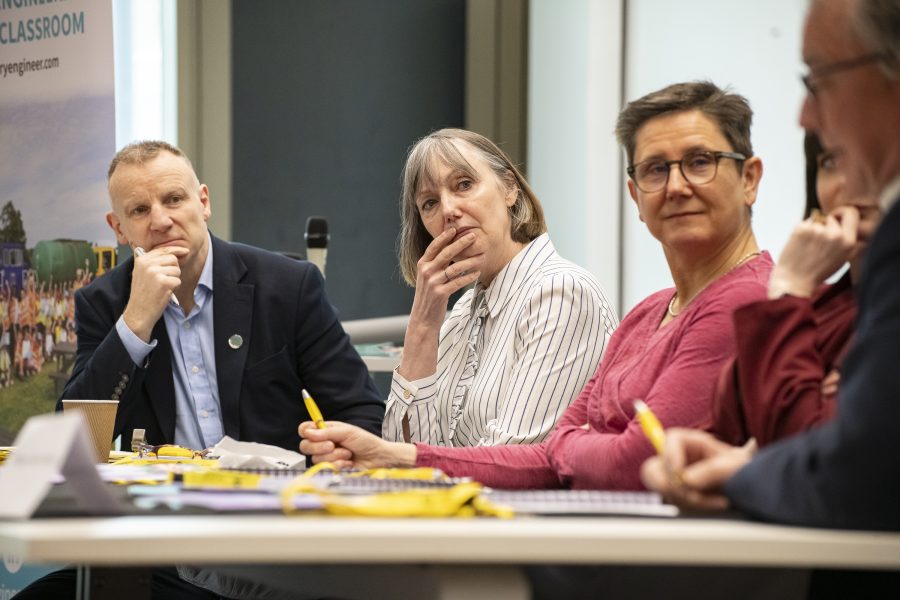
Alongside the key findings of the report are next steps Primary Engineer are taking to ensure the programme continually improves and reaches more pupils, not only in Scotland, but across all devolved nations. The launch of the report in England will be hosted at Rail Live with Porterbrook on June 19th and 20th where school pupils will show off their engineering skills at the centre stage.
The programme continues to be available across England, Scotland and Wales thanks to the many partners who fund the programme, with over 300 schools and 14,500 pupils expected to take part in the 2023/2024 academic year.
The report is available from the Primary Engineer website: https://www.primaryengineer.com/keeping-kids-on-track.
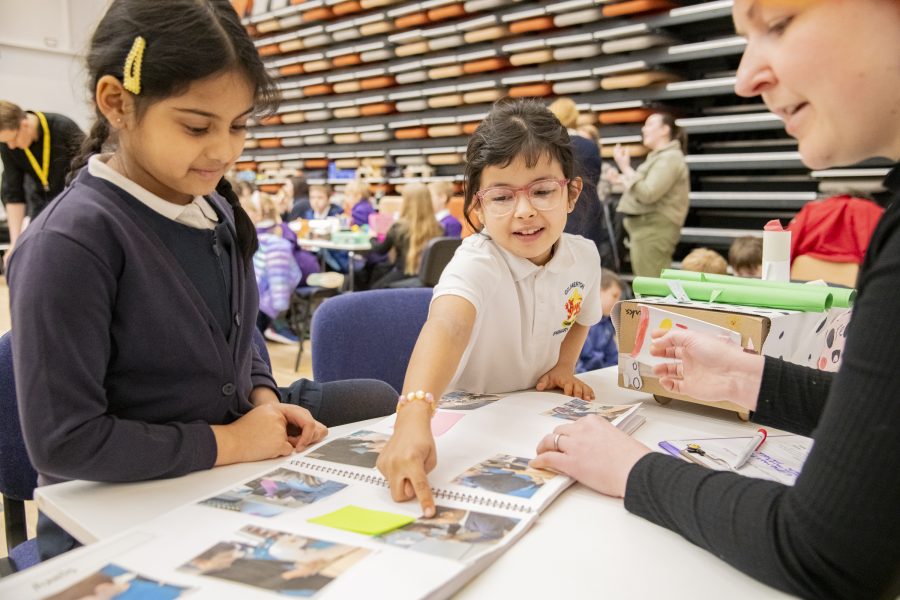
The post Educational Not-for-Profit launches report showcasing the impact of Engineering Outreach with expert panel at The University of Edinburgh. first appeared on Primary Engineer.
]]>The post New Report Reveals Transformative Impact of Primary Engineer Rail Programme on School pupils first appeared on Primary Engineer.
]]>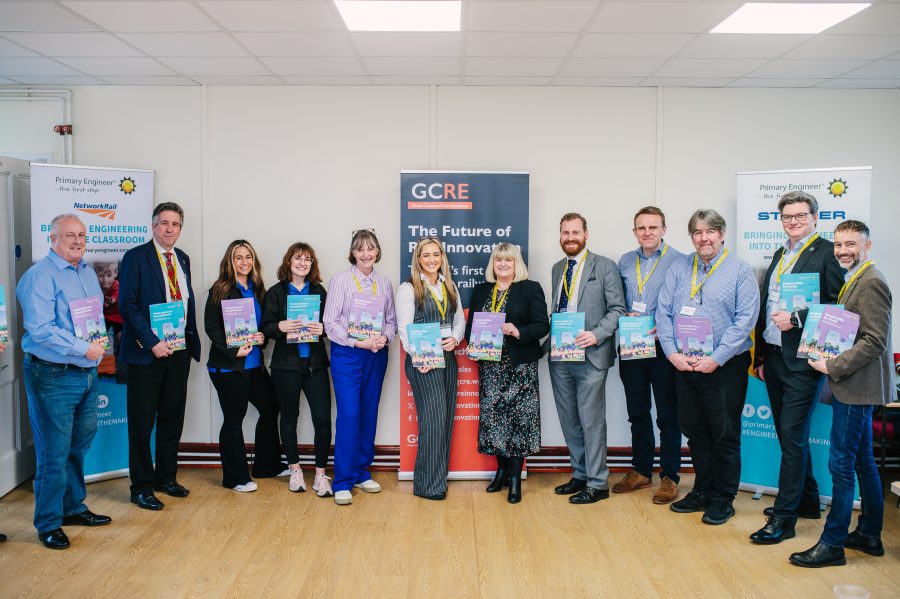
The report, titled “Keeping Kids on Track: Evaluating Five Years of the Primary Engineer Rail Programme,” sheds light on the significant positive impact the programme has had on primary school pupils across the UK. Unveiled on March 14th in Neath, Wales, Primary Engineer were joined by key figures from industry and education to explore the report’s findings and discuss the revelations about the transformative power of the programme.
For five years, the Primary Engineer Rail Programme has brought practical Rail Engineering into classrooms and helped inspire the next generation of engineers. Launched in 2018 with Hitachi Rail, the programme embeds engineering at the heart of learning as young pupils collaborate to design, build, and refine rail vehicle models. Over the course of five years the Primary Engineer Rail Programme has provided 40,000 Rail Engineering learning opportunities across England and Scotland, expanding its reach to Wales since 2023.
The programme culminates in a Celebration Event where pupils test and challenge their designs and share what they have learned with engineering professionals. The report was launched with the Global Centre for Rail Excellence (GCRE), who partner with Primary Engineer in Neath, Wales. Guests of the roundtable were able to see the impact of the Primary Engineer Rail Programme first hand, and the excitement this inspires amongst the pupils and teachers who take part.
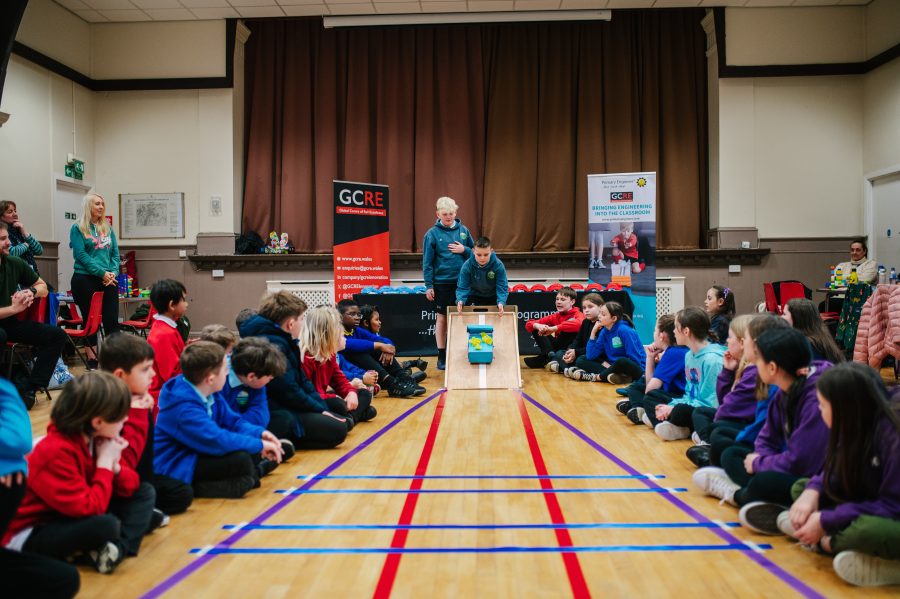
Dr Debra Williams, Chair of the Global Centre of Rail Excellence, commented:
“The celebration event we held this week was a fantastic success and it was wonderful to see the very impressive models that the young people have been working hard on over these last few months. We’re incredibly grateful to the Primary Engineer team for their work and the support we have received from our partners in the UK and Welsh Government.
“For the Global Centre of Rail Excellence, this is a critical strand of work for us. We want to inspire the next generation of young engineers, scientists and researchers living locally to see the exciting future they can build through their passion for scientific inquiry and problem solving. That starts by ensuring young people take an interest in STEM and, importantly, have the opportunity to develop their skills. We want this project with Primary Engineer to be the start of a long-term programme of activity with local schools and young people that helps develop the interests of young people and helps us develop a long-term pipeline of talented people to come and use their skills at the GCRE site.
“The report Primary Engineer have published this week showing their impact on the schools and pupils they have worked with over the last five years shows what can be achieved. Young lives can be transformed when they discover their passion and it’s great to be involved in such an important programme.”
Also on the panel was Dr Susan Scurlock, Founder and Chief Executive of Primary Engineer. Commenting on the launch of the report and the culmination of five years of the programme, Susan said:
“The findings of the report overwhelmingly support that the Primary Engineer Rail Programme is successful in its objectives. Young people are inspired by Engineering, develop richer understandings and interests in Rail Engineering, and express a desire to learn more about Engineering following their experience with us.
It was amazing to be in Neath to launch this report, whilst we have delivered this programme successfully in England and Scotland over the years, we have more recently deployed the programme in Wales with resounding success, thanks to the support of The Department for Business and Trade (DBT), The Global Centre of Rail Excellence (GCRE), Network Rail, Innovate UK, Stadler Rail and the Welsh Government. We look forward to growing our work in Wales, as well as expanding further across the UK.”
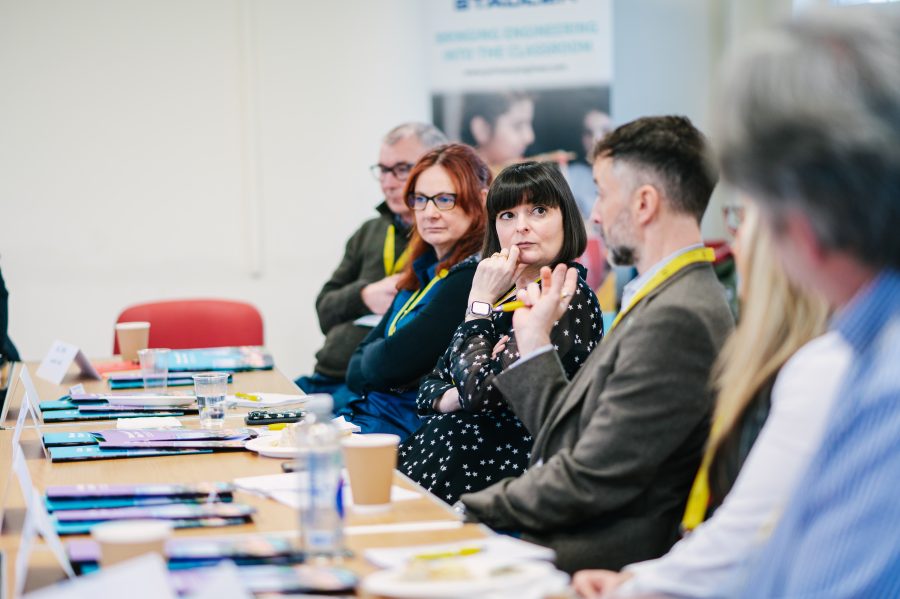
Alongside the key findings of the report are next steps Primary Engineer are taking to ensure the programme continually improves and reaches more pupils, not only in Wales, but also in Scotland and England. Industry, Government and Education come together again for a panel discussion in Scotland on April 17th with The University of Edinburgh, and again at Rail Live in June alongside Porterbrook Rail – both of which partner with Primary Engineer.
The programme continues to be available to school pupils across England, Scotland and Wales thanks to the many partners who fund the programme, with over 300 schools and 14,500 pupils expected to take part in the 2023/2024 academic year.
The report, which is available in both English and Welsh, is available from the Primary Engineer website: https://www.primaryengineer.com/keeping-kids-on-track.
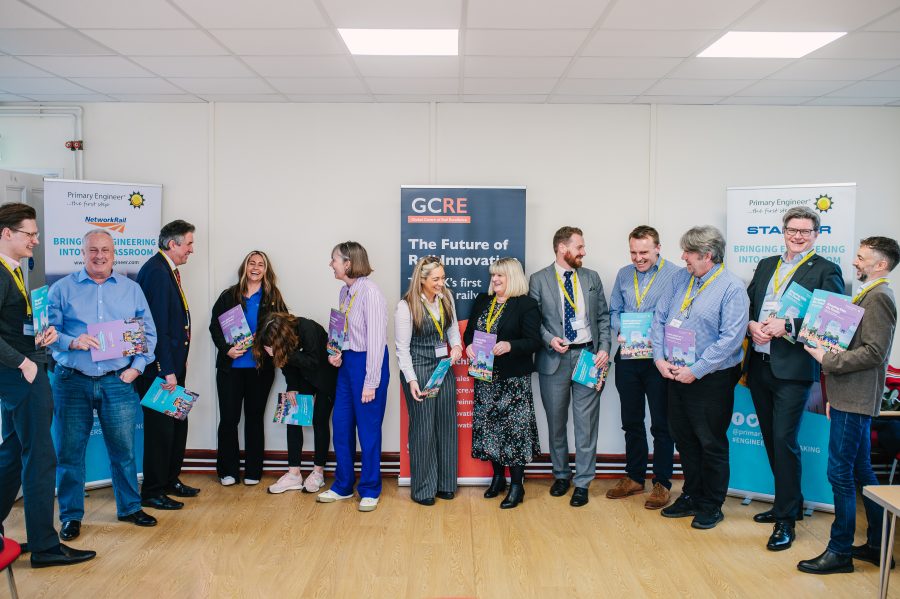
The post New Report Reveals Transformative Impact of Primary Engineer Rail Programme on School pupils first appeared on Primary Engineer.
]]>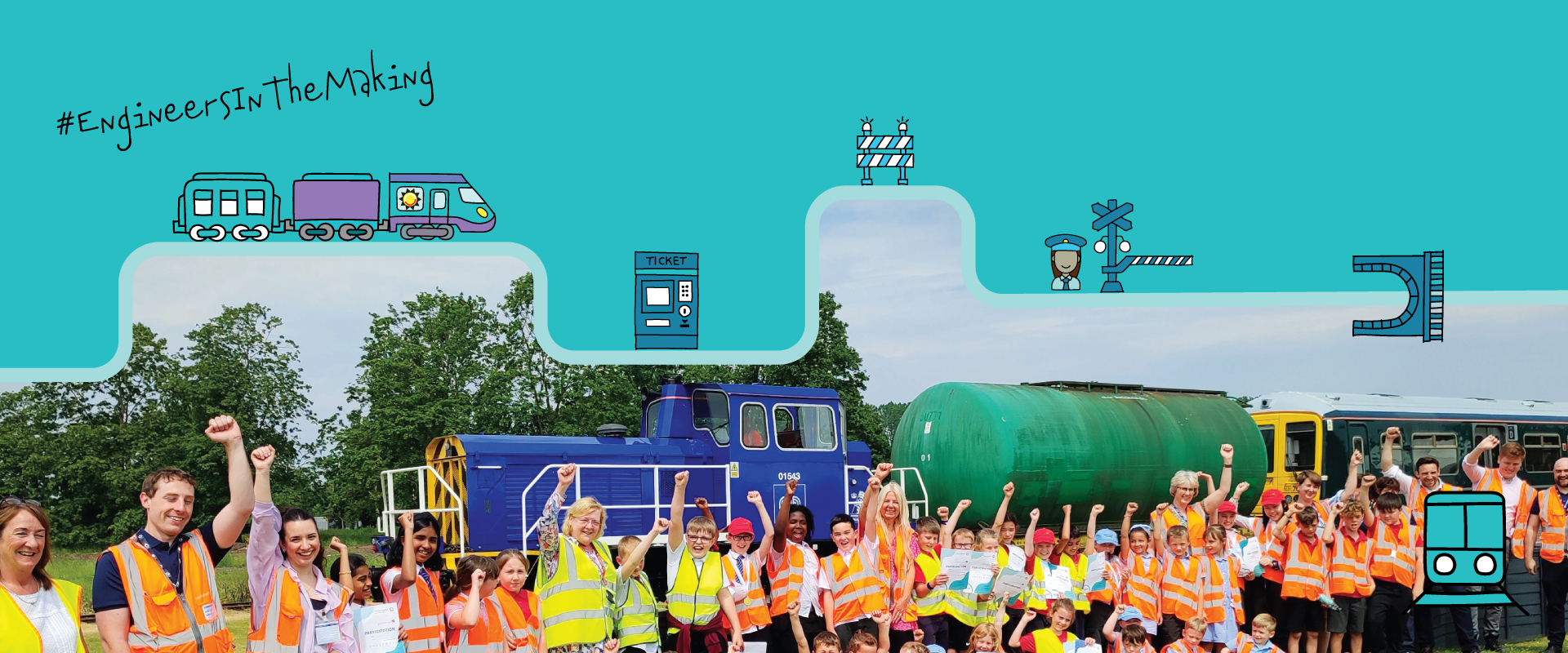

Keeping Kids On Track:
Evaluating Five Years of
The Primary Engineer Rail Programme
Keeping Kids On Track:
Evaluating Five Years of The Primary Engineer Rail Programme
English Language
Welsh Language
If you would like to get in touch to learn more about the Primary Engineer Rail Programme, or how you can get involved with Primary Engineer, please get in touch here: [email protected]
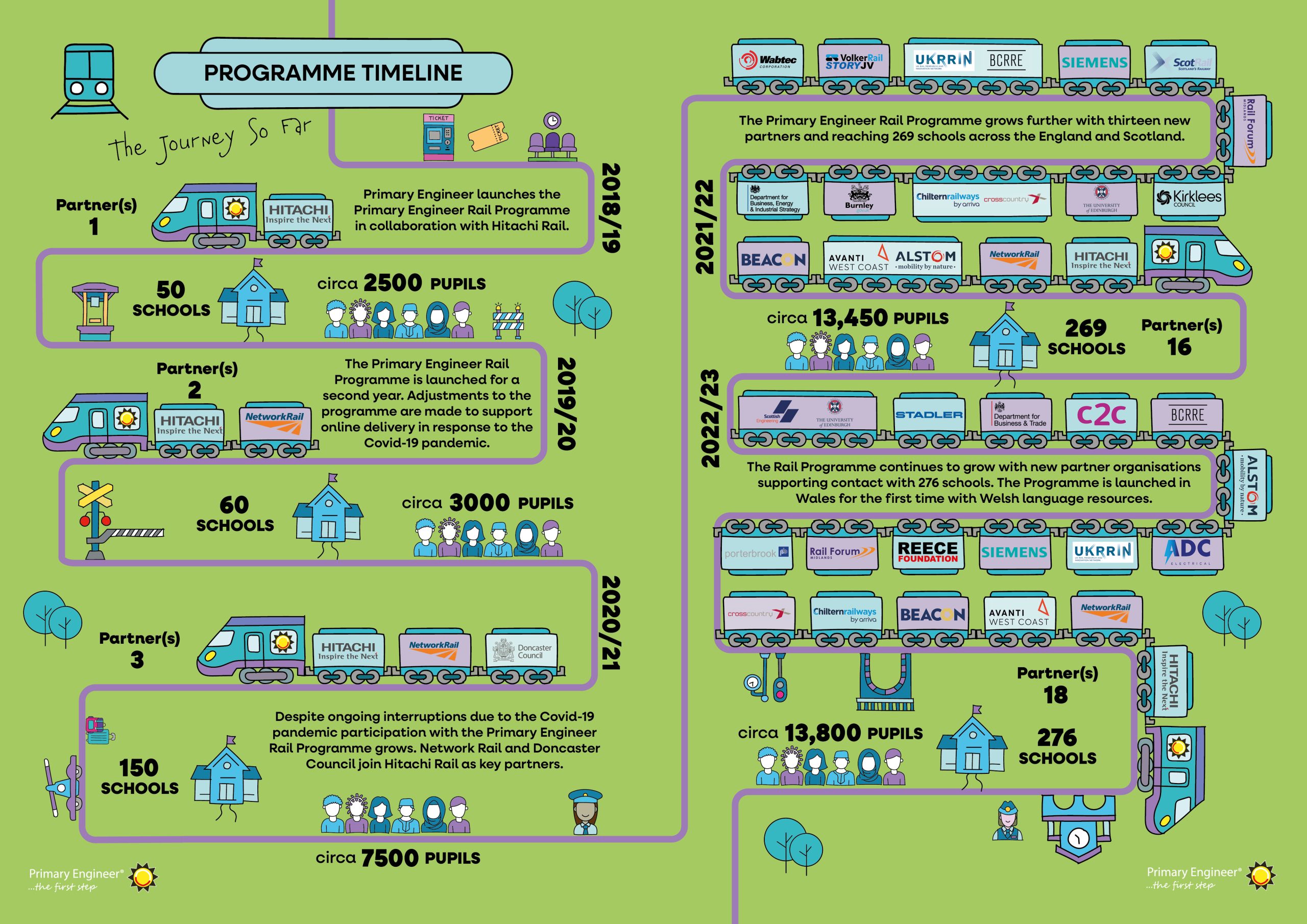
English Language
Keeping Kids On Track:
Evaluating Five Years of The Primary Engineer Rail Programme
Keeping Kids On Track:
Evaluating Five Years of The Primary Engineer Rail Programme
Welsh Language
Cadw plant ar y trywydd iawn:
Gwerthuso pum mlynedd Rhaglen Reilffyrdd Primary Engineer
Cadw plant ar y trywydd iawn:
Gwerthuso pum mlynedd Rhaglen Reilffyrdd Primary Engineer
If you would like to get in touch to learn more about the Primary Engineer Rail Programme, or how you can get involved with Primary Engineer, please get in touch here: [email protected]

The post Keeping Kids On Track: Evaluating Five Years of The Primary Engineer Rail Programme first appeared on Primary Engineer.
]]>